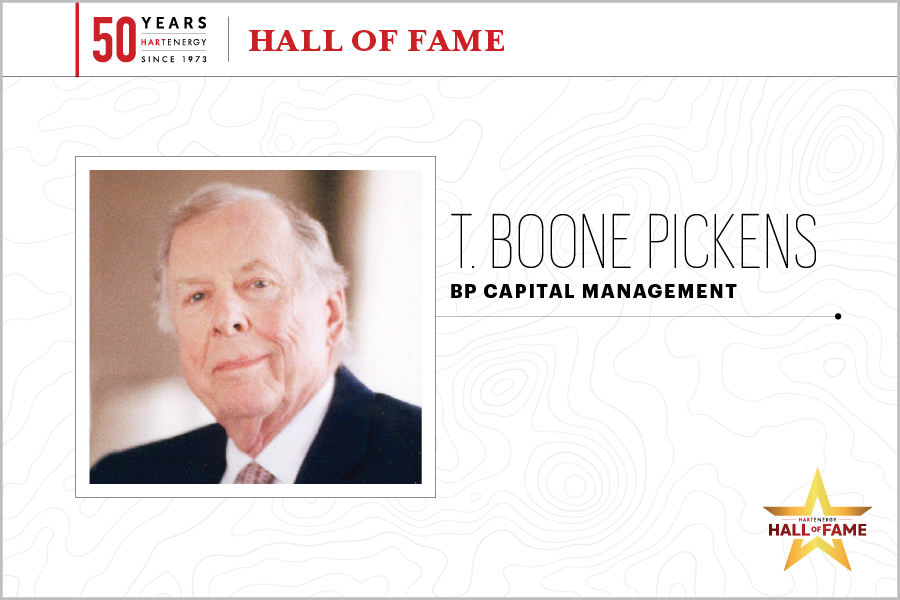T. Boone Pickens
Editor's note: This profile is part of Hart Energy's 50th anniversary Hall of Fame series honoring industry pioneers of the past 50 years and the Agents of Change (ACEs) who are leading the energy sector into the future.

T. Boone Pickens packed more than most into the 91 years of his life. A look at his career highlights reveals that much of what he was doing decades ago remains relevant—perhaps even prescient.
In his 2008 autobiography, “The First Billion is the Hardest,” Pickens (1928-2019) wrote, “Engagement. Involvement. Constant action. That’s the way to live your life.” And he followed that credo well into his 80s, working out every day and bragging about how much he could bench press.
There’s another nugget in that tome, too, which explains a lot about Pickens, his vision and some context for the industry going forward:
“When you’re hunting for elephants, don’t get distracted by rabbits.”
Pickens was born in Oklahoma and graduated with a degree in geology in 1951 from Oklahoma State University, where the football stadium bears his name.
After two years working at Phillips Petroleum Co., he left in 1956 to found Mesa Petroleum in Amarillo, Texas. He would later move its headquarters to Dallas. Mesa became a large natural gas producer that was active in the Texas Panhandle and the huge Hugoton gas field in Kansas. He also drilled in the U.K. North Sea.
Ultimately, Mesa was stung by high debt and low gas prices. In August 1997, it merged with Parker & Parsley Petroleum in Midland, Texas, to form what is today Pioneer Natural Resources, becoming the third-largest independent in the U.S. at that time.
“For three years I had the honor to have Boone as a member of our board of directors. He was a great mentor,” Pioneer CEO Scott Sheffield told Hart Energy upon learning of Pickens’ death in September 2019.
Pickens burst onto the national scene in the 1980s, making the cover of TIME in March 1985, when his actions and that of fellow investors such as Carl Icahn heralded the age of the corporate raider. Today, we live in a time of intensifying shareholder activism, but Pickens was a precursor. He was the person who, more than any other in the 1980s, made oil company executives think twice about shareholder value.
Several consolidations that swept the industry at that time were instigated by him. Pickens would buy enough stock in an oil company target to have a voice, and then he used it, pressuring executives to create value by mergers. It was called “greenmail” and many in the industry resented him for it. His attempt to take over Gulf Oil Co. of Pittsburgh in 1983 led to Gulf being acquired by Union Oil of California in 1984, becoming what is now Chevron—the largest oil company merger of the 1980s. Pickens’ investor group made $760 million on the merger.
Pickens was an innovator who loved to take risks and always saw opportunity. He formed one of the first MLPs in the ’80s, Mesa LP, betting that natural gas prices would rise. He was also the father of the modern day oil and gas royalty trust. More recently, he promoted a water business and wind farms in West Texas. He said his proposed wind business would become the biggest deal of his career, bigger than the Gulf Oil deal.
He was also the founder and force behind BP Capital in Dallas, a hedge fund that won and lost billions making bets on energy commodities. Toward the end of his life, he launched the Pickens Plan, a national campaign to reduce U.S. reliance on foreign oil—an idea that still resonates.
—Deon Daugherty, Editor-in-Chief
